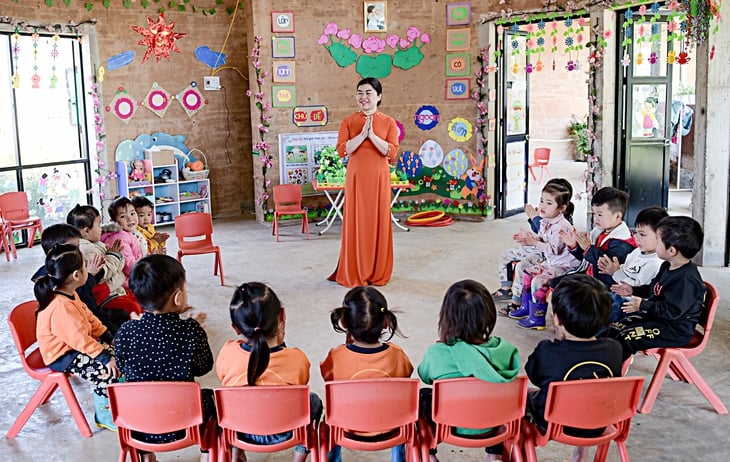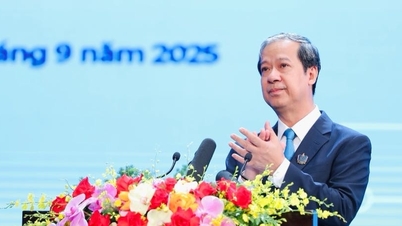
Teacher at Nguyen Thi Minh Khai High School (Xuan Hoa Ward, Ho Chi Minh City) - Photo: THANH HIEP
Notably, this draft has specific regulations on salary policies for teachers, allowances including seniority allowances and increased professional allowances for teachers. This is expected to be a breakthrough policy on teachers' salaries, in the context of many people complaining that "teachers' salaries are not enough to live on".
Many new policies
According to experts and "insiders", the draft under construction has many new points related to salary and allowance policies for teachers. In particular, the draft clearly states that teachers appointed to which positions will be classified as teachers and enjoy a special salary coefficient applicable to that position.
Salary payment must be linked to the performance of teachers and the salary payment source (from the state budget or support and from revenue sources according to the law used to pay salaries) of the educational institution.
Regarding salary transfer, regular salary increase, early salary increase, salary transfer for teachers is implemented according to current regulations on salary transfer for civil servants... In addition, the draft also adds regulations that teachers will enjoy a specific salary coefficient according to each civil servant rank.
Regarding other allowances for teachers, the draft decree stipulates that there are allowances including seniority beyond the framework, job responsibility, region, mobility, working in particularly difficult, toxic, and dangerous areas, implemented according to current regulations of law. Teachers are entitled to seniority allowances according to Government regulations until the new salary policy is implemented.
Notably, the preferential allowance for teachers in the draft decree for some groups of teachers has increased compared to the current level. This is assessed to help improve income and recognize professional contributions, especially for preschool teachers.
Specifically, for preschool teachers, the current preferential allowance is 35%, while the draft proposes to increase it to 45%. The 80% allowance applies to civil servants and employees teaching in preschools in areas with particularly difficult socio-economic conditions according to Government regulations.
In addition, according to the draft, teachers are entitled to a maximum of two responsibility allowances when holding concurrent positions. At the same time, it is expected that position allowances will only be available to principals, vice principals, and school board chairmen.
According to current regulations, the position allowance is for principals, vice principals, heads of professional groups, and deputy heads of professional groups. The draft also expands the scope and level of job responsibility allowance for many groups of teachers who are concurrently holding important roles in teaching and supporting students...
According to experts, the draft decree also proposes many practical and humane support policies to contribute to improving the lives, health and working conditions of teachers, especially teachers in disadvantaged areas.
Teachers are given a health check-up at least once a year. Teachers who are eligible for hazardous allowances are given a health check-up at least twice a year. Policies on support for public housing, housing rental, support for teachers teaching mixed classes, ethnic minority children... Along with that are policies to attract and employ teachers.

Many students in remote areas of Ca Mau province are still keeping up with their studies thanks to the dedication of their teachers - Photo: THANH HUYEN
Concretize the policy of "prioritizing teachers' salaries to be ranked highest"
Speaking with Tuoi Tre, delegate Nguyen Thi Viet Nga (member of the National Assembly's Committee on Culture and Society) said that the draft decree being finalized represents a remarkable step forward in concretizing the policy of "teachers receiving the highest salary in the administrative and career salary scale and table" stipulated in the Law on Teachers.
Accordingly, the highest salary coefficient applied to professors is calculated from level 6.2 (A3.1) plus a special coefficient of 1.3, equivalent to coefficient 8.06 - this is higher than most public administrative positions.
"However, at the general level, especially primary and preschool teachers, the largest group is teachers, and although they enjoy special salary coefficients and allowances, their income is still lower than the average of some other industries.
Therefore, to say that teachers receive the highest salaries, we need to continue to improve the basic salary level, or increase the specific coefficient for the group of teachers at the lower levels - where the occupational pressure is the greatest at present," Ms. Nga suggested.
Another content, according to Ms. Nga, the salary payment principle in the draft decree also approaches in the direction of ensuring fairness, accurately reflecting the professional characteristics and contributions of teachers.
It proposes regulations such as teachers appointed to which positions are given salaries and enjoy special salary coefficients applicable to that position. At the same time, this is not only based on qualifications and positions, but also linked to the results of performing tasks and the characteristics of the working region.
According to Ms. Nga, applying a specific salary coefficient along with the current salary coefficient, plus allowances such as position, seniority, career incentives, etc., is a more comprehensive and quantitative approach than before.
The draft clarifies the responsibility for salary payment sources (from state budget allocation or support and from revenue sources as prescribed by law used for salary payment) of educational institutions, creating a transparent basis for implementation.
Research on increasing allowances for preschool and primary school teachers
In addition to the appreciation, a National Assembly delegate suggested that the drafting agency should study the draft to include clearer and longer-term regulations on the policy of retaining allowances for teachers when they are transferred to difficult areas. Because the current retention period of only 36 months is not really enough to motivate teachers when they are transferred.
At the same time, it is recommended to continue studying the need to increase allowances for preschool and primary school teachers according to a suitable roadmap. Because preschool and primary school teachers are under the greatest work pressure and are often involved in care work, in addition to simple teaching work.
In addition, it is recommended to supplement the housing support regime or rent actual housing for teachers working in remote, isolated and border areas. Specifically, the support level should be regulated to correspond to the actual housing rental price on the local market instead of supporting an amount not lower than the official housing rental price as prescribed.
"There needs to be a mechanism to evaluate the effectiveness of the implementation of the decree after it is issued, expected to take effect from January 1, 2026, to promptly adjust to problems arising in practice. Avoid cases where it is issued but slow to be implemented or not suitable to the actual conditions of teachers in each region," this delegate suggested.
Delegate Tran Khanh Thu (Hung Yen) suggested that the process of drafting the decree should review and evaluate the determination of teachers' salaries according to the salary determination method of Resolution 27 on reforming salary policy for cadres, civil servants and public employees to ensure consistency. At the same time, it is necessary to specify and clearly define the funding source guaranteed by the state budget to pay teachers' salaries annually.
3 breakthrough points of the draft
Ms. Nguyen Thi Viet Nga highly appreciated three main breakthroughs in the draft decree that is being completed.
Firstly, for the first time, a specific salary coefficient has been applied to each group of teachers' titles, from professors to preschool teachers, ranging from 1.1 to 1.6 times. This is a new point of special significance because it affirms the specificity of the profession and ensures a commensurate income level.
Second, the preferential allowance regime is designed in a diverse manner, ranging from 25 - 80% depending on the level of education, region and type of educational institution. Teachers who are teaching in remote, border and island areas receive the highest allowance, clearly demonstrating the priority towards regional equity.
Third, in addition to traditional allowances, the draft also adds new allowances such as combined class allowances, allowances for teachers teaching ethnic minority languages, responsibility allowances for teachers doing student counseling work... "These are practical and reasonable adjustments, compensating for the very specific hardships of teachers," Ms. Nga stated.
Minister of Education and Training:
Teachers' salaries are not enough to live on, leading to extra teaching.
During the question-and-answer session at the National Assembly on the afternoon of June 19, 2025, about the reasons for extra teaching and learning, Minister Nguyen Kim Son said that the reason for extra teaching and learning is because there are still many things that are not enough.
First, according to him, teachers' salaries are not enough to live on; next, there are not enough schools so that students do not have to compete, especially in big cities, urban areas, and densely populated areas. To fundamentally solve this problem, the Minister believes that it is difficult to overcome it "overnight", but requires a very comprehensive solution.
Dr. Nguyen Vinh Hien (former Deputy Minister of Education and Training):
Addressing the concerns of many teachers
Previously, there was news that when implementing the new salary regime, teachers would no longer have seniority allowances, which many teachers were concerned about because some of them had been in the profession for decades. However, in this draft decree, seniority allowances and allowances beyond seniority are still maintained.
The vocational allowance for teachers is increased by 10% compared to the previous regulations, ranging from 25 - 80% depending on the teacher's job position, adding a specific coefficient corresponding to the teacher's job position. In addition, there are regulations for inter-school teaching, teaching at schools with many levels, many school locations...
These are the advantages in the regulations on salaries and allowances for teachers in the draft decree. How to treat teachers to match the important position of teachers has always been a big issue that has been raised for many years. The Law on Teachers and the decree regulating salary policies, allowances, support policies, and attraction for teachers will be the legal corridor to promote the implementation of the goal of "the highest teachers' salary in the administrative career salary scale system".
A principal of a private high school in Hanoi:
Consider carefully "the longer you work, the higher your salary"
When reading the draft decree regulating salary policy, allowance regime, support policy, and attraction for teachers, it can be seen that salary and allowance payment is also based on specific job descriptions, depending on the subject and area where teachers work. This is reasonable, ensures fairness, and encourages teachers to work and contribute, especially young people.
However, I have some concerns about seniority allowance. Considering the working age, corresponding to the seniority, at stage 3 (51 - 70), teachers may be "outdated", not updated with new trends, stagnation gradually replaces creativity, labor productivity will generally decrease.
If we look at the above career "roadmap", we can see that paying seniority allowances in the way that the longer you work, the higher the allowance will be, which contradicts the view of paying salary according to job description (job position, productivity, quality).
Ms. Nguyen Thi Mai (Nguyen Du High School, Ho Chi Minh City):
Good students have chosen pedagogy
In the 12th grade class that I am in charge of this year (2024-2025 school year), there are two excellent students who have chosen to apply to the University of Education, the Faculty of Mathematics and the Faculty of Physics. I asked them why they chose to study pedagogy, and they frankly said: "From 2026, teachers' salaries will be the highest in the salary scale system of the administrative and career sector.
This proves that the State has paid special attention to the education sector in general and teachers in particular. When there is attention from leaders at all levels, teachers will have many opportunities to demonstrate their abilities, improve their expertise, and develop their careers...". I am very happy about this.
Changes that motivate teachers

Teachers and students of Lung Vai school, Vi Xuyen commune, Ha Giang (old, now Tuyen Quang province) - Photo: NAM TRAN
The draft decree proposed by the Government has brought many expectations about significantly improving the lives and incomes of teachers.
With specific salary payment principles and salary calculation formulas, this draft realizes the Party and State's guiding viewpoints on the education career, while promising to create a strong driving force to improve the quality of the teaching staff.
Outstanding advantages
One of the first notable new points is the principle of ranking salaries according to job titles. This brings more fairness and transparency in determining salary levels, accurately reflecting the capacity, qualifications and working position of each teacher at a specific time.
Instead of applying a common salary scale, classifying by title will encourage teachers to continuously improve their professional skills to achieve higher titles, thereby improving their income. However, the regulation needs to be considered to ensure that the title is linked to the actual job position to create a competitive advantage for employees.
The next advantage is the policy of retaining the salary difference. Retaining the difference will create peace of mind, avoid major financial disruptions, and help teachers feel secure in their work and dedication.
This draft also retains seniority allowances. This is especially important for teachers with seniority who already had stable salaries under the old regulations.
In addition, regular salary increases and early salary increases are still implemented according to current regulations for civil servants. This continues to encourage teachers to strive in their work, complete their tasks well to have the opportunity to increase their salary, contributing to improving their periodic income.
Clear and transparent salary calculation formula
This formula demonstrates the clarity and transparency in calculating the income of teachers and lecturers. The elements that make up the salary are listed specifically, including the basic salary coefficient, position allowance (if any), seniority allowance beyond the framework and especially the difference in the reserve level. This helps teachers easily visualize and calculate their own salary, creating peace of mind and trust in the new policy.
Create great motivation for teachers to confidently contribute, proactively improve their professional qualifications, according to the assigned job position. When life is guaranteed, teachers will have more enthusiasm and energy to invest in teaching and research, contributing to improving the quality of comprehensive education.
This policy also has the meaning of attracting and retaining talents for the education sector, especially good teachers who are passionate about their profession, and encouraging the advancement of young teachers.
Associate Professor, Dr. Chu Cam Tho (Deputy General Secretary of Vietnam Association of Psychology and Education)
Source: https://tuoitre.vn/dot-pha-ve-tien-luong-cho-giao-vien-20250726082825339.htm



![[Photo] Off-road racing: Adventure sport, attractive tourism product](https://vphoto.vietnam.vn/thumb/1200x675/vietnam/resource/IMAGE/2025/9/14/45123bd29c884b64934da038d947d344)


![[Photo] General Secretary To Lam attends the Digital Popular Education Symposium - Digital National Assembly](https://vphoto.vietnam.vn/thumb/1200x675/vietnam/resource/IMAGE/2025/9/13/43ebd93f0f5e4d98a2749dab86def7cd)

![[Photo] Vinh Hao-Phan Thiet Expressway has a frog's jaw](https://vphoto.vietnam.vn/thumb/1200x675/vietnam/resource/IMAGE/2025/9/13/a89ffa426f7a46ffb810cb1d7bdfb1b8)































































































Comment (0)